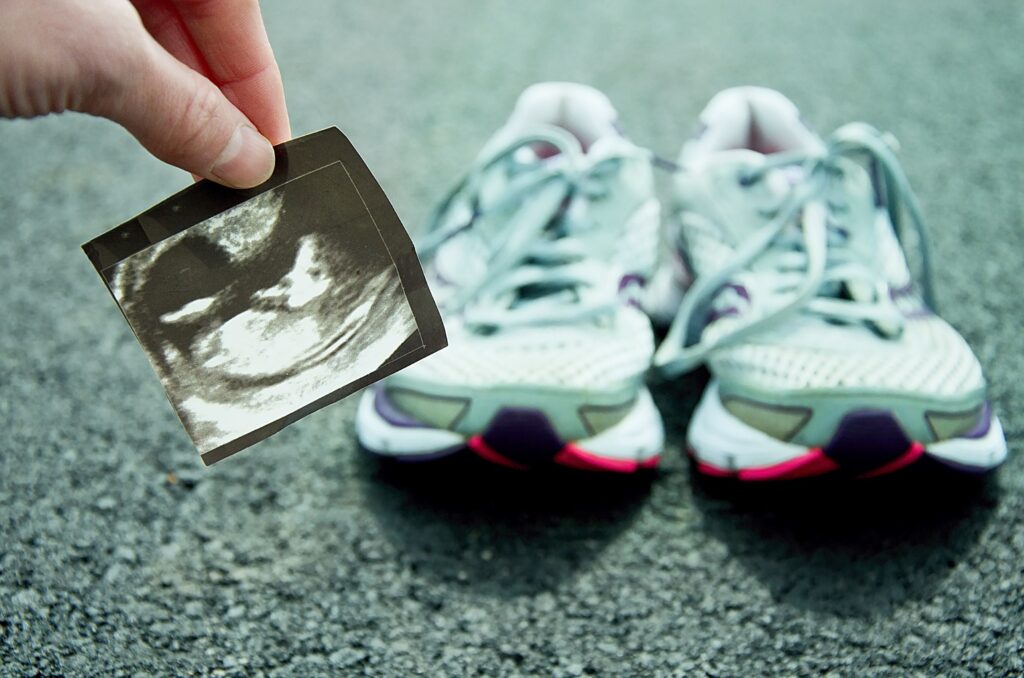Pregnant Woman And Running: What You Need To Know
Whether you’re at the stage of your baby using your uterus as a punching bag, or have just recently conceived there’s no denying that running when pregnant needs some careful consideration. Not least because your mental state has probably shifted as much as your pregnancy hormones.
Sadly for the time-poor, deciding to run whilst pregnant isn’t as simple as lacing up your running trainers, doing a few half-hearted leg swings and getting out there.
No, now that you’re growing a baby there are multiple considerations to take into account – some of which might not be so obvious.
From building strong pelvic floor muscles to exactly how high your heart rate should be going, what terrain you should (and potentially should not) be running on, why strength training is a must and what a run might actually look like now that you’re expecting – there’s a lot to think about being pregnant runners.
For all pregnant women, it’s always important to clear any exercise with your doctor. And while exercising during pregnancy has many benefits, you may need to adjust based on your trimester. Fueling up properly and staying hydrated before and after your run can help prevent certain health issues, and if you’re feeling tired or worn out, it’s best to stop or slow down.
Some women can continue clocking up the miles as pregnancy progresses – and others can run all the way through.
As with all aspects of the baby journey, one size does not fit all. That maxim applies as much to our well-meaning family and friends who may caution us to stay clear of any running as it does to the potential for running to remain one of our ways of staying active during pregnancy.
Always ask your healthcare provider for advice about which exercises are safe for you to do throughout pregnancy and how much exercise is safe for you to do at each stage of pregnancy.

Is running while pregnant safe?
In the early days, there’s a real fear that putting on your gym kit and going for it could dislodge the baby. But that’s simply not true. In the first trimester, the baby is in the pelvis, so it’s actually protected by bone at that stage. You’re not going to dislodge the baby by doing exercise.
But, you do need to consider that whilst external changes in the first trimester your might be minimal, there’s a lot of stuff going on internally.
If you’re in good health and your pregnancy is uncomplicated, with no vaginal bleeding, you can. Running while pregnant is considered to be generally safe for you and your baby. Some women, however, have medical conditions or pregnancy complications that mean they should not exercise at all. Check with your healthcare provider before starting to run – or before you start to exercise regularly – during pregnancy. If your provider gives you the green light, the key is to listen to your body – don’t push yourself beyond your limits.

Benefits of running during pregnancy
In general, exercising during pregnancy is a good thing for both your mental and physical health. Staying active during pregnancy can help shorten the length of labor and reduce the risk of having a cesarean section. And regular movement can also help prevent gestational diabetes and may be a factor in preventing postpartum depression.
Going for a run is a quick and effective way to give yourself a mental and physical boost when you feel tired, and like walking, you can do it almost anywhere, so it’s easier to fit into your schedule. Here’s a breakdown of some of the mental and physical benefits you’ll get from running during pregnancy:
- Mental benefits include an increased feeling of well-being and self-confidence, as well as the ability to cope better with stress.
- Running can also help you sleep better and reduce stress. It’s been found to boost natural levels of beta-endorphins, which are chemicals in the brain that improve mood, increase feelings of pleasure and reward, and make you feel good.
- Physical benefits include increased energy, away from heart and lung disease (in many cases), reduced back pain, improved balance and posture, a healthier immune system, weight loss (if you need it), toned muscles (especially if your running routine includes strength training), and less pain during labour. Running regularly can also help prevent gestational diabetes by improving glucose tolerance.
- If you’re looking for a way to get out of the house or away from your desk for a few minutes during the day to clear your head or feel more energized without having to go to the gym or spend money on a personal trainer, try running! It’s easy on your joints so it’s safe if you’re not used to being active or you’re coming back from an injury—you’ll be able to start slowly without worrying about hurting yourself. And once you’re used to running, you can start trying other activities like yoga or swimming. You’ll be amazed at how much better you feel once your body adjusts to regular movement.

Tips for exercising during pregnancy
If your pregnancy is uncomplicated and you don’t have medical reasons to avoid exercise, you can continue to run throughout your pregnancy. You should be able to continue running through the first trimester without any problems. You just need to take a few precautions to protect yourself and the baby.
By the second trimester, you’ll probably begin feeling more tired than usual when exercising – that’s normal. But if you feel lightheaded or short of breath while running, slow down or stop altogether. If you still feel uncomfortable after a break, check with your healthcare provider before continuing on with your run.
The third trimester is usually fine for running too – it’s just that by this point in your pregnancy, tiredness will probably be setting in at some point during most runs (or other workouts). You may try to do something else to stay active (like walking or swimming). Again, if you feel like something’s wrong during a workout (or ever), slow down or stop altogether and check in with your healthcare provider before resuming moderate-intensity exercise.
If you want to keep running throughout your pregnancy, follow these tips:
- Always warm-up for 5–10 minutes before starting your run.
- Don’t overdo it. If you feel lightheaded or short of breath, slow down or stop altogether.
- Drink plenty of water before, during and after your run (or other workouts).
- Wear supportive shoes that fit well and have plenty of cushioning to help absorb the shock of each footfall.
- Wear clothing that fits well and is made from a breathable material like cotton so it will allow your skin to breathe as you run, which will help prevent overheating. You’ll probably find that a sports bra is more comfortable than a regular bra during exercise.
- If you can, schedule your runs in the morning or evening when it’s cooler out. If you live in a hot climate, try to run during the early morning or late evening hours when it’s cooler out.
- Avoid running on hot days – the asphalt can heat up to very high temperatures and make you feel uncomfortable.
- Avoid running on surfaces that are very hard or have a lot of cracks (like concrete) – they can jar your body and make you feel uncomfortable.
- Get plenty of rest after your runs so you’ll be ready for your next one!
- Wear sunscreen (SPF 30 or higher) if you’ll be outside for an extended period of time.
- Avoid running in areas where there’s a lot of pollution – it can make you feel uncomfortable and may even trigger asthma attacks.
- Avoid running in areas with high pollen counts – it can make you feel uncomfortable, and also trigger asthma attacks. If your doctor gives you the OK, take your inhaler with you and use it anytime during your run that breathing feels difficult or uncomfortable.
- Avoid running when there’s lightning in the area – it’s not worth the risk, especially when there are safer alternatives like treadmills and elliptical machines.







